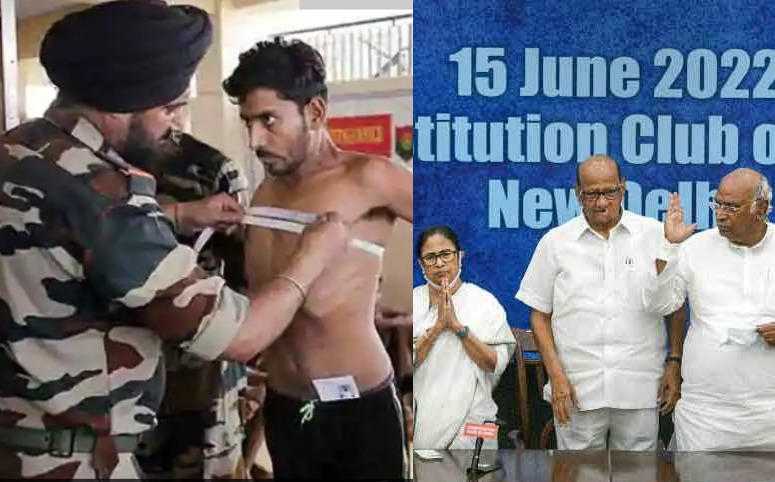
Weekly Update: Why Agnipath is A Good Path; How Oppn is BJP’s Strongest Suit
In the first four days after registration opened for recruitment to the Indian armed services, the Indian Air Force (IAF) alone received 94,281 applications. That volume of applications will, in all probability, grow manifold as the days go by and as the other services, the Indian Army and the Indian Navy, tot up the applications they receive.
The announcement of the number of applications that the air force received has done two things. First, it has almost instantly silenced critics of the scheme who were calling it discriminatory and undemocratic. And second, more importantly, it has highlighted what is probably the Indian economy’s toughest challenge: frighteningly large levels of unemployment among the country’s youth.
The Indian government introduced the Agnipath Scheme as a new way of recruiting youth into the armed services at ranks lower than that of commissioned officers. Inducted cadets will get a four-year tenure with a stipend paid to them and at the end of the tenure, 25% of them will be inducted into the services while the rest will get a golden handshake–a sum of ₹12 lakh to start entrepreneurial ventures as well as preference if they want to join police or other state security services.
The background to the scheme is important. The armed services incur a huge outflow of money that goes to pay pensions, salaries and other personnel-related expenses. By some estimates they account for a quarter of India’s defence budget. The Agnipath scheme would alleviate some of those recurring expenses and allow the defence ministry to deploy more funds into critical areas like augmenting defence equipment and modernisation.
However, opposition parties, including the Congress and some other regional parties vehemently opposed the scheme, mainly on the grounds that they felt a more consensual approach ought to have been adopted but also that it discriminated and curbed the rights of new recruits, 75% of whom would leave service after the four-year tenure. But as initial data show, the scheme could turn out to be a hit.
The reason for its appeal is simple and stark. Youth unemployment in India has reached staggering proportions. According to the Times of India, “Youth unemployment in urban areas across India rose sharply to 25.5% in the April-June quarter of 2021 and remained in the double digits thereafter as the second wave of the Covid-19 pandemic battered economic activities and dealt a severe impact on jobs.”
Do the maths. Nearly 40% of the Indian population is aged 13 to 35 years (defined as youth in the National Youth Policy). Forty per cent of the population is roughly 560 million people. If we look at the minimum employment age in India, which is 14, we are still talking about at least 500 million employable youth. If 25% of them are unemployed, how serious do you think the problem is?
It is small wonder that the Agnipath Scheme has found growing appeal among young Indians. Jobs in the public sector have not been growing; and in the private sector the emphasis is on automation and leaner workforce with lower wage costs. In scenario such as that if young people have an opportunity to earn and get training for four years and then have a shot at either becoming soldiers, airmen or sailors or, if they aren’t inducted, entrepreneurs, is that not an appealing alternative, say, to driving an auto rickshaw or delivering food from restaurants to people’s homes?
Some more numbers to mull. In the first year, an Agnipath recruit would earn (in-hand) ₹21,000 a month and by the fourth year that would go up to ₹28,000. Not really a bad deal, is it?
India’s Opposition Needs a Plan
Some years ago when the Congress party had started what has now become its free-fall journey into oblivion, one newspaper had written that Rahul Gandhi was the Bharatiya Janata Party’s strongest trump card. Gandhi was then messing up in all possible ways: losing election after election for his party; lacking coherent strategies about any issue that he addressed; and losing the support and respect of his party’s other leaders and functionaries.
Now, one could expand on that cheeky comment and probably say that the BJP’s strongest suit is the Opposition. Besides opposing anything that is proposed or done by the government–the misplaced opposition to Agnipath is a case in point–India’s Opposition parties have little else to get active about. The situation is the same in the states as it is in the Centre.
When was the last time we heard a constructive critique of the Union Budget from any Opposition party? When was the last time an Opposition party leader appraised India’s handling of the Covid pandemic (which, considering the number of people that live in India, has been quite commendable)? Have we ever seen a whitepaper from the Opposition on how India’s unemployment problem ought to be tackled? Or a strategy that addresses our government’s bewildering stance when it comes to international issues such as the Russian aggression in Ukraine? Sadly, India’s Opposition is bankrupt of ideas. And that is why it is the strongest suit in BJP’s hand.



